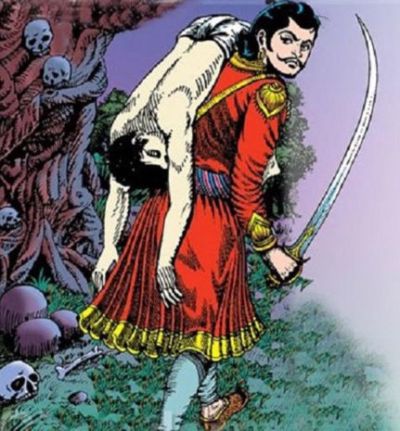In this city, King Candraprabha fasted and performed tapasya, distributed more of his wealth and fed more Brāhmans, and performed the śrāddha.
He then went to Vārāṇasī, which seemed by the silken flags of it’s temples, tossed about in the gusts of wind, to cry out from afar…
“Come here, and attain mokshā!”

तस्यां दिनान्य् उपोष्य त्रीण्य् अभ्यर्च्याथ वृषध्वजम् ।
भोगैर् निजोचितैस् तैस् तैः प्रययौ स गयां प्रति ॥ १२,२६.८४ ॥
ततः फलौघनमितैर् मञ्जुगुञ्जद्विहंगमैः ।
पदे पदे सप्रणामं स्तूयमान इवाङ्घ्रिपैः ॥ १२,२६.८५ ॥
विक्षिप्तवन्यकुसुमैर् अर्च्यमान इवानिलैः ।
नानारण्यान्य् अतिक्रम्य पुण्यं प्राप गयाशिरः ॥ १२,२६.८६ ॥
विधाय तत्र च श्राद्धं विधिवद् भूरिदक्षिणम् ।
चन्द्रप्रभः स राजात्र धर्मारण्यम् उपेयिवान् ॥ १२,२६.८७ ॥
गयाकूपे ऽस्य ददतः पितुः पिण्डं तदन्तरात् ।
समुत्तस्थुस् तम् आदातुं त्रयो मानुषपाणयः ॥ १२,२६.८८ ॥
तद् दृष्ट्वैव स विभ्रान्तः किम् एतद् इति पार्थवः ।
कस्मिन् हस्ते क्षिपे पिण्डम् इत्य् अपृच्छन् निजान् द्विजान् ॥ १२,२६.८९ ॥
ते तम् ऊचुर् अयं तावद् एकश् चौरस्य निश्चतम् ।
हस्तो लोहमयः शङ्कुर् यस्मिन् देवैष दृश्यते ॥ १२,२६.९० ॥
द्वितीयो ब्राह्मणस्यायं करो धृतपवित्रकः ।
राज्ञः पाणिस् तृतीयो ऽयं साङ्गुलीयः सुलक्षणः ॥ १२,२६.९१ ॥
तन् न विद्मः क्व पिण्डो ऽयं निक्षेप्यः किम् इदं भवेत् ।
इत्य् उक्तस् तैर् द्विजैः सो ऽत्र राजा लेभे न निश्चयम् ॥ १२,२६.९२ ॥
King Candraprabha fasted for three days in that city, as he worshipped Śiva intensely. He then set out for Gayā.
As he travelled through the forest, the trees, that were bent due to the weight of their fruits, and the birds, that sung sweet songs, seemed to welcome him at every step, by bowing before him and singing his praises. The winds blew flowers in his direction, as if honoring him for his noble deeds.
And so he crossed the forest and reached Gayā, where he performed the śrāddha, and then started to perform the Pinda-dānā (offering of rice balls) at the holy well, when, to his surprise, out of it rose three human hands to receive the dānā.
The bewildered king asked his chief priest…
“What is the meaning of this? To which hand should I offer the pinda?”
The chief priest replied…
“My king, in the first hand, one can clearly see an iron spike, which is used for digging small holes at night – so that is certainly the hand of a thief…”
“The second hand that holds the darbha grass, surely belongs to a Brāhman…”
“And the third hand, that has a precious ring and bears the marks of a Kshatriya, surely belongs to a king.”
“But I am not sure to which hand you are to offer the pinda, or what this all means in the first place…”
King Candraprabha was equally confused, and was unable to make a decision.
इत्य् आख्याय कथाश्चर्यं वेतालो ऽंसस्थितस् तदा ।
स त्रिविक्रमसेनं तं जगाद नृपतिं पुनः ॥ १२,२६.९३ ॥
तत् कस्य हस्ते देयः स्यात् स पिण्ड इति वक्तु मे ।
भवांस् तावत् स एवात्र प्राक्तनः समयश् च ते ॥ १२,२६.९४ ॥
The Vetāla finished his story, and then addressed King Vikram and said…
“So tell me, o King, to which hand should the king offer the pinda-dānā? And what did this all mean?“
“Remember, if you know the answer, and don’t tell me the truth, your head will burst into a hundred pieces!“
King Vikram replied…
to be continued…
